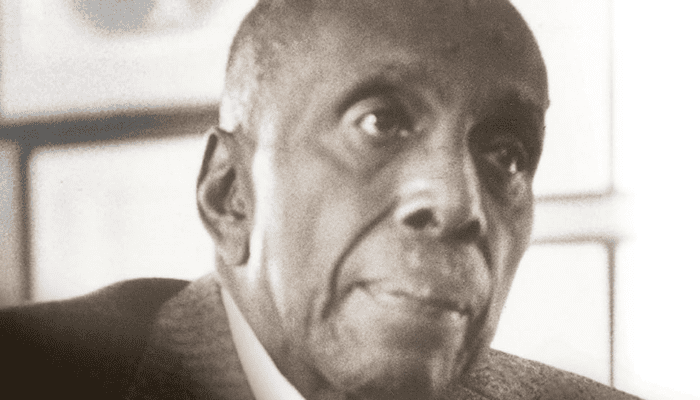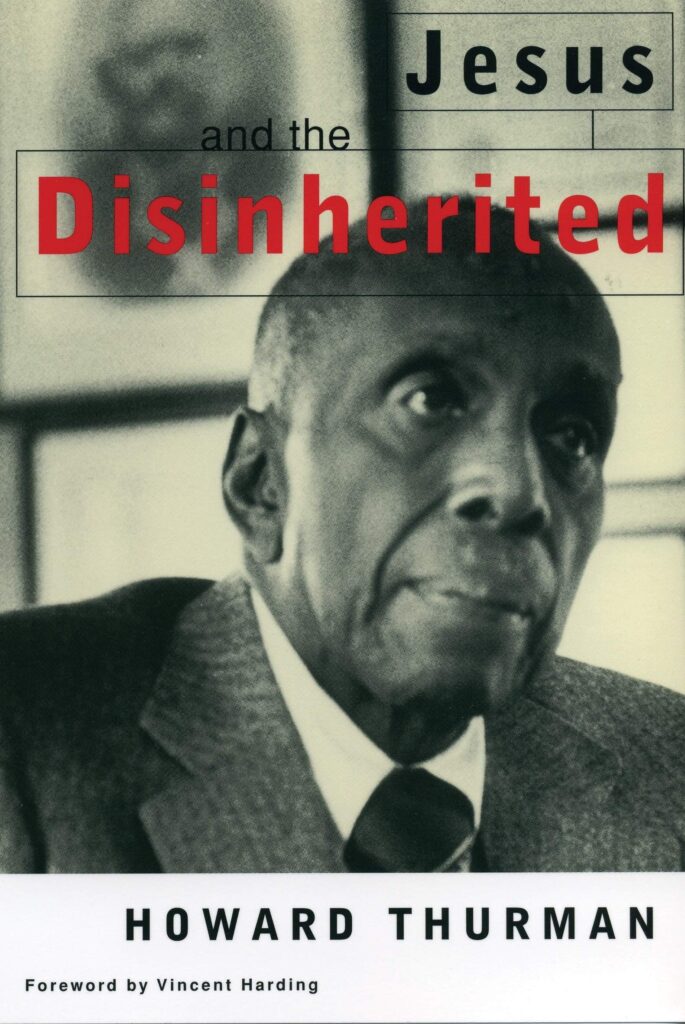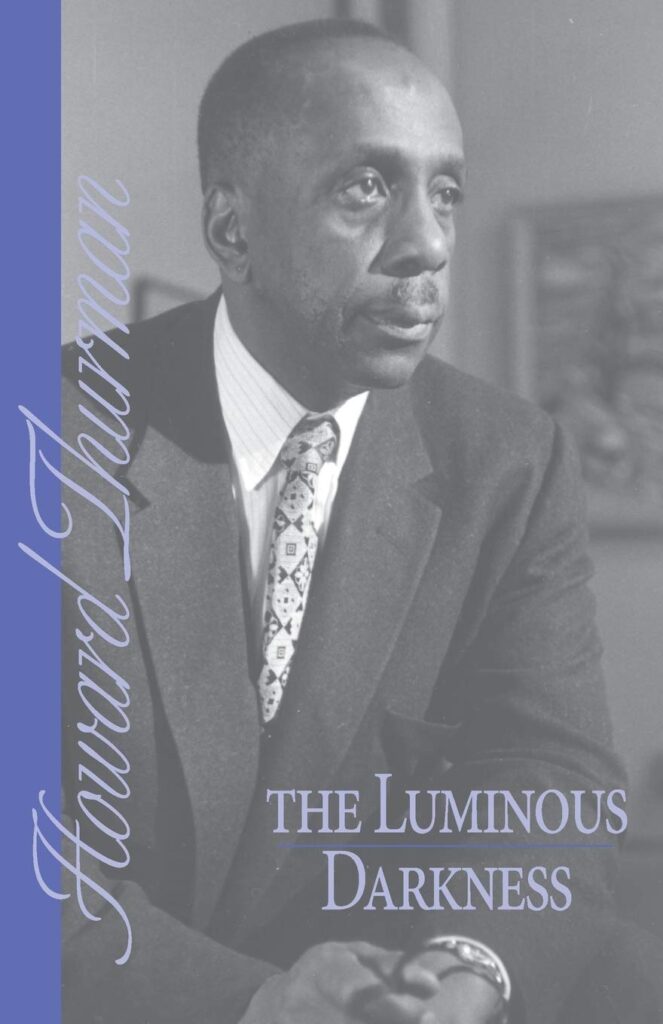
Reflections on the Life and Thought of Howard Thurman

By Lewis Brogdon
Howard Thurman (1900-1981) was one of the most influential religious figures of the 20th century. His influence transcended the field of religion, making significant investments into the lives of some of the leading figures of the 20th century. Ironically, despite the influence that Howard Thurman had on figures like Martin Luther King, Jr., Vernon Jordan, Arthur Ashe, Maya Angelou, Jesse Jackson, and Alice Walker, he has somehow remained relatively unknown. So, I would like to introduce this towering figure to the Christian Ethics Today family of readers as a supplement to the insightful essays in this special edition of the journal.
Howard Thurman was born and raised in a segregated community in Daytona Florida. His mother Alice and his grandmother raised him after his father Solomon died when he was only seven. Thurman spent his early years at Mt. Bethel Baptist Church and graduated from Morehouse College in Atlanta GA: afterwards he attended Rochester Theological Seminary graduating in 1926 with a Bachelor of Divinity. Howard Thurman served both the church and the academy teaching at prestigious institutions like Morehouse College, Howard University, and Boston University. Along with Albert Frisk, he established The Church for the Fellowship of All Peoples in San Francisco the first intentionally multicultural church in the United States. Along with an impressive academic track record, he has also received multiple awards and notable accomplishments. Thurman was the first dean of the Andrew Rankin Chapel at Howard University. He traveled to India and met Mohandas Gandhi while serving on behalf of the World Student Christian Federation as the chair of the Delegation of Friendship. In 1953, he became the dean of Daniel L. Marsh Chapel and was the first fulltime African American professor at Boston University. In that same year he was recognized by TIME magazine as one of the twelve best preachers of the 20th century.
 However, Howard Thurman may be best recognized for his books, particularly, Jesus and the Disinherited. Thurman’s ideas as expressed in his writings display not only his genius and theological acumen; they reflect a mind regarded by many as ahead of his time. He frequently commented in his writings and sermons that he had never heard a sermon on what the religion of Jesus had to say to those whose backs were against the wall. During his time in India, he was challenged; or rather his fidelity to the religion of Jesus was challenged, because African Americans were practicing the religion of their oppressors. In this stirring confrontation the trajectory of his thought began. In his autobiography With Head and Heart, he reflected on the challenge which led him to believe the religion of Jesus in its true genius offered a promising way to work through the conflicts of a disordered world and projected a creative solution to the pressing problem of survival for minorities (Thurman 1979, 218). Although this response might have seemed adequate, Thurman pursued this theme in later lectures and the book Jesus and the Disinherited was sparked. In a similar way he questioned “the apparent inability, the demonstrable failure of Christianity to deal effectively with a system of social and economic injustice with which it existed side by side throughout the Western world” (Thurman 1979 218-19). His critic in India suggested that his fidelity to the religion of his oppressors was a betrayal of all the darker peoples of the earth (Thurman 1976, 15). In his book Deep River and the Negro Spiritual Speaks of Life and Death he echoed a similar sentiment that “many all over the world feel Christianity is weakest when it is brought face to face with the color bar” (Thurman 1975, 46). While he did not attempt to defend the ways in which White Americans corrupted and distorted the religion of Jesus, he was deeply committed “to preserve at all costs, the inspirations and strengths of the religion of Jesus” (Thurman 1979, 219). As such, there is much import in the religion of Jesus to those whose backs are against the wall. He employed what I like to describe as a redemptive hermeneutic that allowed him to see beyond religion’s distortion at the hands of those who practice it. He was able to do this because this practiced was passed down to him from his African ancestors in America. A clear example of this comes from his book Deep River. Thurman clearly stated that the slaves redeemed the religion that the slave master had profaned (Thurman1975, 36). Therefore, in a similar way, he sought to redeem the true genius of the religion of Jesus from those who had grossly misrepresented the faith. He saw that there was more to Christianity than the lies and violence practiced by so many white sisters and brothers in Christian churches, an insight he recognized in the religion of enslaved Africans. I think this aspect of his thought has great value for the challenges we face today as Christianity continues to be distorted. Like Thurman, we must call out these distortions but also nurture and give voice to the true genius and deeper value of the gospel.
However, Howard Thurman may be best recognized for his books, particularly, Jesus and the Disinherited. Thurman’s ideas as expressed in his writings display not only his genius and theological acumen; they reflect a mind regarded by many as ahead of his time. He frequently commented in his writings and sermons that he had never heard a sermon on what the religion of Jesus had to say to those whose backs were against the wall. During his time in India, he was challenged; or rather his fidelity to the religion of Jesus was challenged, because African Americans were practicing the religion of their oppressors. In this stirring confrontation the trajectory of his thought began. In his autobiography With Head and Heart, he reflected on the challenge which led him to believe the religion of Jesus in its true genius offered a promising way to work through the conflicts of a disordered world and projected a creative solution to the pressing problem of survival for minorities (Thurman 1979, 218). Although this response might have seemed adequate, Thurman pursued this theme in later lectures and the book Jesus and the Disinherited was sparked. In a similar way he questioned “the apparent inability, the demonstrable failure of Christianity to deal effectively with a system of social and economic injustice with which it existed side by side throughout the Western world” (Thurman 1979 218-19). His critic in India suggested that his fidelity to the religion of his oppressors was a betrayal of all the darker peoples of the earth (Thurman 1976, 15). In his book Deep River and the Negro Spiritual Speaks of Life and Death he echoed a similar sentiment that “many all over the world feel Christianity is weakest when it is brought face to face with the color bar” (Thurman 1975, 46). While he did not attempt to defend the ways in which White Americans corrupted and distorted the religion of Jesus, he was deeply committed “to preserve at all costs, the inspirations and strengths of the religion of Jesus” (Thurman 1979, 219). As such, there is much import in the religion of Jesus to those whose backs are against the wall. He employed what I like to describe as a redemptive hermeneutic that allowed him to see beyond religion’s distortion at the hands of those who practice it. He was able to do this because this practiced was passed down to him from his African ancestors in America. A clear example of this comes from his book Deep River. Thurman clearly stated that the slaves redeemed the religion that the slave master had profaned (Thurman1975, 36). Therefore, in a similar way, he sought to redeem the true genius of the religion of Jesus from those who had grossly misrepresented the faith. He saw that there was more to Christianity than the lies and violence practiced by so many white sisters and brothers in Christian churches, an insight he recognized in the religion of enslaved Africans. I think this aspect of his thought has great value for the challenges we face today as Christianity continues to be distorted. Like Thurman, we must call out these distortions but also nurture and give voice to the true genius and deeper value of the gospel.
Another substantial contribution made by Thurman was his emphasis on love for all people regardless of race, religion, or social status. He refused to let go of the universal and expansive vision of God and the human family. Love was no cheap word for one raised in the segregated South where “lynchings, burnings, unspeakable cruelties, were the fundamentals of existence for Black people” (Thurman 1976, 36). It was reasonable for him to reject his White Christian counterparts for the evils that they continually perpetuated against those whose backs were against the wall. So, when he called for people to respond to one another in love and not out of hatred or bitterness that destroys the soul, one can see just how radical a claim this really was. It is specifically at this juncture that the true genius and depth of Thurman is most evident because he truly offered a kind of vision that redeemed the corrupted Christianity of White segregationists. He refused to submit the Christian ethos to fear, deception, and hatred. In a segregated society that undermined the existence of Blacks on every hand, he encouraged them to embrace not only oneself in love but also one’s neighbor. Fear, deception, and hatred only destroy one’s personhood, robbing them of the integrity that rightfully belongs to them because they are God’s children.
 There were also prophetic dimensions to his thought. He had a vision of a better tomorrow that he laid before America in writings like The Luminous Darkness. Thurman explored the anatomy of segregation and the hope before them if they responded with courage and love. He thought that it was only a matter of time before the walls of segregation were removed and thus it was imperative for both Black and White Americans to learn how to live with one another. Only together could the damage of segregation be healed and the root of this evil, which existed in the heart and mind, be eradicated. In a similar article entitled “The Will to Segregation” he reminded both Black and White Americans that segregation is a mutual threat to oneself and to a democratic society and that it was fundamentally important to relax the will to segregation in order that a sound basis of hope might be attained (Thurman 1998, 216). This sinful impulse to categorize, differentiate, and separate ourselves from “others” is at the heart of America’s flawed social program of segregation. But, like prophets of old, Thurman called out the evils of the day and called the people to a better vision of God’s world; his words were ignored. Americans did not listen to him, but someone did. Thurman had a profound influence on Dr. Martin Luther King, Jr., who reportedly carried a copy of Jesus and the Disinherited with him during the Civil Rights Movement and wrote in his final book Where Do We Go From Here: Chaos or Community that we must learn to live together as brothers and sisters or perish together as fools. There are echoes of Thurman’s ideas in King’s writings and speeches. I often wonder what kind of country we would be today had they listened to Thurman and King.
There were also prophetic dimensions to his thought. He had a vision of a better tomorrow that he laid before America in writings like The Luminous Darkness. Thurman explored the anatomy of segregation and the hope before them if they responded with courage and love. He thought that it was only a matter of time before the walls of segregation were removed and thus it was imperative for both Black and White Americans to learn how to live with one another. Only together could the damage of segregation be healed and the root of this evil, which existed in the heart and mind, be eradicated. In a similar article entitled “The Will to Segregation” he reminded both Black and White Americans that segregation is a mutual threat to oneself and to a democratic society and that it was fundamentally important to relax the will to segregation in order that a sound basis of hope might be attained (Thurman 1998, 216). This sinful impulse to categorize, differentiate, and separate ourselves from “others” is at the heart of America’s flawed social program of segregation. But, like prophets of old, Thurman called out the evils of the day and called the people to a better vision of God’s world; his words were ignored. Americans did not listen to him, but someone did. Thurman had a profound influence on Dr. Martin Luther King, Jr., who reportedly carried a copy of Jesus and the Disinherited with him during the Civil Rights Movement and wrote in his final book Where Do We Go From Here: Chaos or Community that we must learn to live together as brothers and sisters or perish together as fools. There are echoes of Thurman’s ideas in King’s writings and speeches. I often wonder what kind of country we would be today had they listened to Thurman and King.
Howard Thurman was one of the most significant intellectuals of the 20th century. Every pastor and church leader should have a few copies of Thurman’s writings in their library so they can mine the depths of his thought. His ideas are as insightful today as they were in times past. However, his insistence on a dogged love for all persons in a society that systematically oppressed him and his people, was truly one of his greatest contributions to the church and Christian theology. He modelled agape love and used it to inform his life and work. His writings redeemed the religion of Jesus from fear, deception, and hatred. May we take up this same work in 2024 and beyond.
Howard Thurman, With Head and Heart: The Autobiography of Howard Thurman (New York: Harcourt Brace and Jovanovich, 1979).
Howard Thurman, Jesus and The Disinherited (Boston: Beacon Press, 1976).
Howard Thurman, Deep River and the Negro Spiritual Speak of Life and Death (Indiana: Friends United Press, 1975).
Howard Thurman, The Luminous Darkness (New York: Harper and Row Publishers, 1965).
Howard Thurman, A Strange New Freedom: The Best of Howard Thurman on Religious Experience and Public Life. Eds. Walter Earl Fluker and Catherine Tumber. (Boston: Beacon Press, 1998).
— Lewis Brogdon (Ph.D.) is the Executive Director of the Institute for Black Church Studies and Associate Professor of Preaching and Black Church Studies at the Baptist Seminary of Kentucky in Lexington and Louisville Kentucky.
Leave a Reply
You must be logged in to post a comment.


